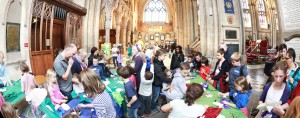
Youth & Childrens Adviser, Dan Jones writes, I have had the privilege of organising, leading, helping and visiting a wide variety of holiday clubs and what have I learned?
In this short article, Dan explains that by applying some basic ground rules, or top tipsusing a mnemonic tool, the potential for chaos can be minimised and the fun can be maximised because holiday clubs should be fun for all involved the children as well as the leaders and helpers!
N = Needs:
First things first - is there a need? There is no point organising something simply for the sake of it. You may know children who would like something extra on top of Sunday School and might invite their friends too. You may have a good connection with the local school or you may want to provide something in addition to the church down the road. Whatever the need might be, it can be soul destroying investing loads of effort and energy into something and no one turns up.
A = Aim:
The next stage to think about is the aim of the holiday club. Again, this may sound an obvious question but it is important to agree from the onset, as it will bode well for future planning. The majority of church holiday clubs contain a strong evangelistic message, as the environment provides an excellent opportunity to share the Gospel. However, depending on the needs, offering something overtly Christian may not be the best option. Often providing crafts, games and activities that focus on developing and building relationships can be more beneficial for the church and the wider community.
O = Objectives:
Again, when objectives are not set the identity and focus of a holiday club can be lost very quickly. Therefore it is important to add to the aim some goals that clearly explain some of the key reasons why you are running the holiday club. Remember that the objectives should not become the criteria for success or failure; they provide helpful reminders of your rationale for running the holiday club.
M = Method:
Now that you have your aims and objectives, it is time to start thinking about whats going to happen during the holiday club. There are a number of great ready-made resources but dont just assume that what works for other churches will work in your context. There are a number of ready-made resources available and at this point it may be worth contacting the Youth & Childrens Adviser for some helpful guidance on the next steps.
I = Implement:
Hopefully by now many of the reasons why have been defined and planning now turns to the practicalities of how to run the holiday club? Questions such as: what will be the venue? What insurance will we need? What about health and safety? How many volunteers are needed? How will they know what to do? Will they need training? What about costs? Are we going to advertise the holiday club?
E = Evaluation:
Yes, it may seem strange to be thinking about life after the holiday club, but so much youth and childrens work focuses on the task at hand and fails to reflect on what is going on. Do make sure that some form of evaluation process is pre-planned. A quick meeting after each day or a meal together two weeks later to share stories and reflect on what worked well and (and what didnt) will help you massively if and when you plan to do something similar again.